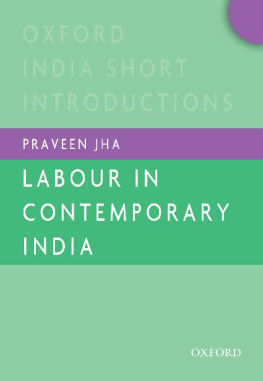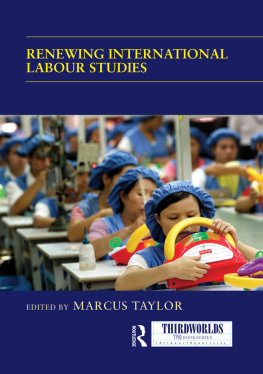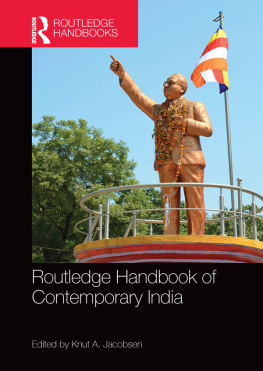OXFORD
INDIA SHORT
INTRODUCTIONS
LABOUR IN CONTEMPORARY INDIA
The Oxford India Short
Introductions are concise,
stimulating, and accessible guides
to different aspects of India.
Combining authoritative analysis,
new ideas, and diverse perspectives,
they discuss subjects which are
topical yet enduring, as also
emerging areas of study and debate.
OTHER TITLES IN THE SERIES
Caste
Surinder S. Jodhka
Coalition Politics in India
Bidyut Chakrabarty
Political Economy of Reforms in India
Rahul Mukherji
Dalit Assertion
Sudha Pai
Capital Flows and Exchange Rate Management
Soumyen Sikdar
Trade and Environment
Rajat Acharyya
Monetary Policy
Partha Ray
The Civil Services in India
S.K. Das
Panchayati Raj
Kuldeep Mathur
Affirmative Action in India
Ashwini Deshpande
The Right to Information in India
Sudhir Naib
For more information visit our website:
http://www.oup.co.in/section/academic-general
OXFORD
INDIA SHORT
INTRODUCTIONS
LABOUR IN CONTEMPORARY INDIA
PRAVEEN JHA
Oxford University Press is a department of the University of Oxford.
It furthers the Universitys objective of excellence in research, scholarship,
and education by publishing worldwide. Oxford is a registered trademark of
Oxford University Press in the UK and in certain other countries.
Published in India by
Oxford University Press
YMCA Library Building, 1 Jai Singh Road, New Delhi 110 001, India
Oxford University Press 2016
The moral rights of the author have been asserted.
First Edition published in 2016
All rights reserved. No part of this publication may be reproduced, stored in
a retrieval system, or transmitted, in any form or by any means, without the
prior permission in writing of Oxford University Press, or as expressly permitted
by law, by licence, or under terms agreed with the appropriate reprographics
rights organization. Enquiries concerning reproduction outside the scope of the
above should be sent to the Rights Department, Oxford University Press, at the
address above.
You must not circulate this work in any other form
and you must impose this same condition on any acquirer.
ePub ISBN-13: 978-0-19-908971-0
ePub ISBN-10: 0-19-908971-X
Typeset in 11/15.6 Bembo Std
by Excellent Laser Typesetters, Pitampura, Delhi 110 034
Printed in India by Replika Press Pvt. Ltd
For
My Students at JNU
And Their Struggles for a Secular, Egalitarian,
and Socialist India
With Affection and Gratitude
Contents
Keeping in with the mission of the Oxford India Short Introductions, this monograph seeks to offer to a wide range of readers an accessible introduction on a large and complex subject, namely labour in contemporary India. It has been a hugely challenging task and my academic engagement with the world of labour for more than three decades did not make it any easy! However, I hope to have flagged the core issues and concerns relevant to the subject in a coherent manner and with a clear perspective. In putting together this monograph, I have drawn from, and built on, some of my earlier published works (in journals and book volumes) and gratefully acknowledge the same.
As John Kenneth Galbraith once said, writers are more in debt to friends (and I would add, their academic foes) than they usually know. I have been extremely fortunate in having a large number of colleagues (some of them my mentors) and friends who have been an enduring source of ideas and support; to all of them my obligation is indeed great. The list of my allies is long and they are spread across the globe but many of them are at the Centre for Economic Studies and Planning and the Centre for Informal Sector and Labour Studies, Jawaharlal Nehru University, New Delhi. To heed to Galbraiths wise counsel, and also to absolve them of their influence on me, I stay away from naming my wonderful comrades, colleagues, and friends here!
The labour question has occupied the centre stage in the political discourse of the recent times. The question of the well-being of a majority of the labouring people in the country is closely tied with macroeconomic policies as well as the recognition of workers rights. Critical amongst these is the right to access basic amenities, decent work, and livelihoods. According to the International Labour Organization (ILO), the concept of decent work is important because it sums up the aspirations of the labouring people. It basically refers to the creation of opportunities to get productive work which is secure, provides a fair living income, and ensures social security for the working class families. It also means that workers have the right to organize and participate in the decisions that affect their lives. A perspective on decent work also refers to the equality of opportunity to all sections of society irrespective of their caste, creed, or gender. According to the ILO, common forms of gender discrimination include: lack of recognizing of household work, sexual harassment, women tending to be in the lower paid and less skilled jobs, less organized, and women being often considered supplementary workers. In India, other forms of discrimination, such as along lines of caste and ethnicity, are also rampant, thereby highlighting the interface between social structures and the patterns of employment. Decent work entails, inter alia, the removal of discrimination in places and conditions of work and the creation of conditions where people get equal pay for equal work. The gender differences are also reflected in an Enterprise Survey from the World Bank in 2006, which reported that 9.1 per cent of firms had female participation in ownership compared to 18.4 per cent for the average in South Asia, and that 5.1 per cent of full-time employees were women, compared to South Asia at 13.7 per cent ().
The generation of opportunities for decent work and livelihood ought to be among the most important policy objectives on any meaningful agenda of economic development. But the Indian experience has been far from satisfactory on this front and as in many other developing countries, our country has also not been able to resolve the structural and systemic problems that have led to widespread poverty and unemployment. Even during the first four decades after Independence, achievements on these counts were not impressive, despite the strategy of relatively autonomous development and public sectorled industrialization which resulted in unprecedented and quite respectable rates of economic growth and a State which aimed to provide for some amenities to all classes of people.
The contemporary debates on labour law reforms and the overall well-being of labour in neo-liberal India have to bear the relevant structural factors in mind. As is well known, among the major premises of neo-liberalism was the argument that in the case of developing countries the inward looking capital-intensive import substitution policy had resulted in a bias against agriculture and other employment-intensive activities, with respect to both the domestic and external markets, and thus labour utilization had been well below potential; it was hoped by the advocates of neoliberalism that the market reforms would rectify the above noted bias and facilitate a surge of investment, both from domestic and foreign sources, in labourintensive projects with significant export-orientation. All the available evidence since the ascendancy of the neo-liberal economic reforms confirm that the expectations regarding greater labour utilization in India (as indeed in the global economy as a whole), through changes in structure as well as intensity of employment, have not been realized.











